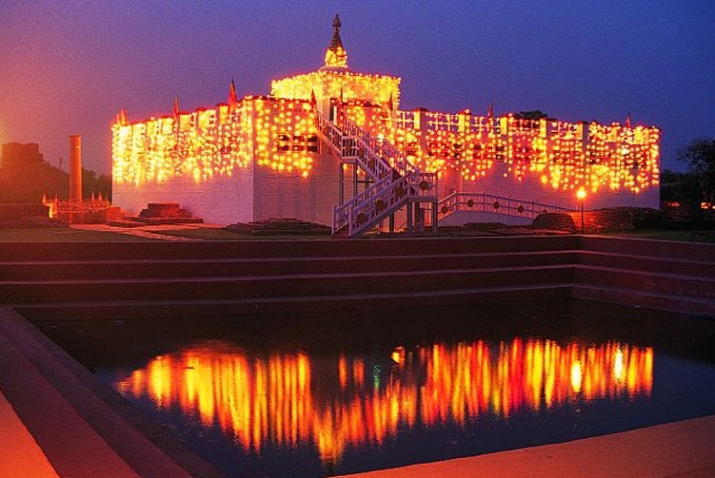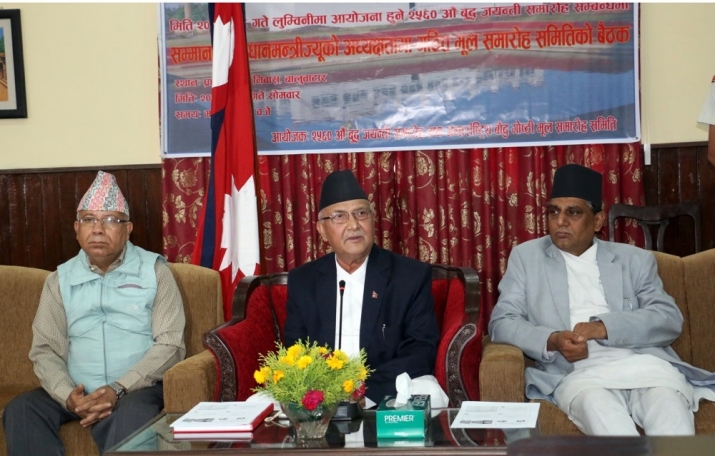NEWS
Indian Officials to Boycott Buddhist Conference in Nepal in Diplomatic Spat
 Maya Devi Temple in the UNESCO World Heritage Site of Lumbini, Nepal, is the main temple at Lumbini, traditionally considered the birthplace of Shakyamuni Buddha. From friendsadventure.com
Maya Devi Temple in the UNESCO World Heritage Site of Lumbini, Nepal, is the main temple at Lumbini, traditionally considered the birthplace of Shakyamuni Buddha. From friendsadventure.comIndia has decided to officially boycott an international Buddhist conference and commemorative ceremony to mark the birth anniversary of the historical Buddha, Shakyamuni, scheduled for later this week in Nepal. Indian prime minister Narendra Modi and a number of other official guests from India had been invited to attend the events.
The conference, titled “Lumbini, Nepal: The Birthplace of Lord Buddha and the Fountain of Buddhism” and featuring presentations by Buddhist scholars from Nepal and overseas, will be held in Kathmandu from 19–20 May. The forum will be followed by the 2560th Buddha Jayanti on 21 May in Lumbini, believed to be the birthplace of Siddhartha Gautama (known as the Buddha after his enlightenment), to be attended by government officials and dignitaries and guests from around the world.
Recent media reports indicate that India is unhappy that Nepal’s Ministry of Culture, Tourism and Civil Aviation, which is organizing this week’s events, has purportedly received US$1.5 million in funding from China, and that the theme of the conference has been changed from the earlier “Preservation and Development of Buddhist Heritage of Nepal,” with the sub-theme “Lumbini—Birthplace of Buddha,” to one that promotes Nepal as the principal source of Buddhism.
Buddhism has played a central role in diplomatic power plays between China and India, with Nepal sandwiched between the two geographic and economic giants. Modi in particular has gone to considerable lengths to promote India’s Buddhist history as a shared bond with China that dates back more than 2,000 years, despite the fact that Buddhists make up only a tiny fraction of India’s present population. The Indian government views the latest move as just one of a number of attempts by China to establish a strategic geopolitical foothold in Nepal.
According to a report by Catch News, a portion of the reported US$1.5 million funding is believed to have come in the form of donations of US$100,000 each from four Buddhist temples in China at the Buddhist sites of Mt. Wutai, Mt. Emei, Mt. Putuo, and Mt. Jiuhua—which are linked to the enlightenment of the bodhisattvas Wenshu (Skt. Manjushri), Puxian (Skt. Samantabhadra), Guanyin (Skt. Avalokiteshvara), and Dizang Wang (Skt. Kshitigarbha)—with the balance routed through the Buddhist Association of China, the Chinese temple at Lumbini, and a number of Chinese commercial associations based in Kathmandu. The involvement of the four major temples is seen by India as further validation of attempts by Nepal, with China’s assistance, to establish Lumbini as the preeminent center of Buddhist pilgrimage over Bodh Gaya in India, where the Buddha is said to have attained nirvana or enlightenment.
Earlier this month, Nepali prime minister Khadga Prasad Sharma Oli publicly stated that in addition to being born in Lumbini, Siddhartha Gautama’s decision to renounce his crown, his family, and his life of privilege indicated that he had also attained enlightenment in Nepal. Oli further asserted that the three Buddhist “sects” had all originated in Nepal.
 Nepali prime minister Khadga Prasad Sharma Oli, speaking at his official residence on 9 May, asserted that Shakyamuni Buddha also attained enlightenment in Nepal. From kathmandupost.ekantipur.com
Nepali prime minister Khadga Prasad Sharma Oli, speaking at his official residence on 9 May, asserted that Shakyamuni Buddha also attained enlightenment in Nepal. From kathmandupost.ekantipur.com“There exists some confusion about the Buddha. This is because of lack of adequate publicity. The conference with international participation will help remove the confusion and prove that Buddha and the Buddhist philosophy started from Nepal,” Oli said. (The Kathmandu Post)
The list of dignitaries invited to this week’s events in Nepal also includes Chinese president Xi Jinping, South Korean president Park Geun-hye, Sri Lankan prime minister Ranil Wickremesinghe, and United Nations secretary-general Ban Ki-moon, along with ministers for culture and religious affairs from Bhutan, Cambodia, China, Israel, Japan, Laos, Mongolia, Myanmar, South Korea, Sri Lanka, Thailand, and Vietnam, and representatives of Buddhist organizations from 23 countries.
See more
Buddha in a diplomatic jam: Nepal-China take on India over Buddhist heritage (Catch News)
Buddhist Conference will clear up confusion regarding Buddha: PM Oli (The Kathmandu Post)
Int’l leaders invited for Buddhist meet (The Himalayan Times)
2560th International Buddha Jayanti Celebration and Bouddha Seminar 2016
Buddhistdoor View: The Buddhist Great Game Between India, Nepal, and China (Buddhistdoor Global)
Thoughts on the Global Hindu-Buddhist Initiative in Delhi, 3–4 September 2015 (Buddhistdoor Global)
Buddhistdoor View: India’s Buddhist Diplomacy (Buddhistdoor Global)
Buddhistdoor View: Buddhism at the Heart of Sino-Indian Relations (Buddhistdoor Global)














